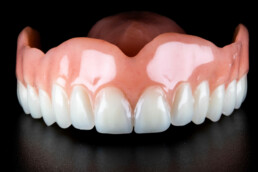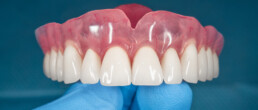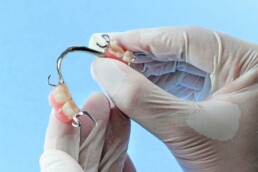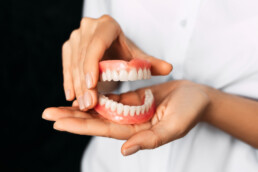The difference between digital and conventional dentures
Looking for a new set of full dentures but are unsure whether to go digital or conventional? Newer technologies allow for a higher level of customisation and precision when desiging and manufacturing custom made full dentures.
The difference between digital and conventional dentures
The landscape of dentistry is evolving, and with advancements in technology, a revolutionary change has taken place in the world of dentures. Digital dentures have emerged as a game-changer, offering a superior alternative to conventional dentures. In this blog, we will delve into the differences between digital and conventional dentures, shining a spotlight on why digital dentures stand out as the preferred choice for many seeking a modern, precise, and comfortable solution.

Understanding conventional dentures
Conventional dentures have been a reliable option for individuals with missing teeth for a long time. However, the process required to record, try-in and fabricate conventional dentures with impressions and wax is tedious and mostly uncomfortable. This process can draw out over a significant period of time due the the time and skill required to perform each step clinically and in the laboratory.
Common drawbacks of conventional dentures include
Inherent Inaccuracy: The traditional methods of crafting conventional dentures often result in a less-than-perfect fit. This can result in sore/rubbing spots and discomfort during normal wear and use.
Time-Consuming Process: Crafting conventional dentures involves a series of appointments, making the process lengthy and potentially inconvenient for those seeking a quicker solution.
Limited Customization: Conventional dentures may offer limited options for customization, when using carded denture teeth professionals are limited to the dimensions of the teeth provided. This can, in some cases, present a less than ideal result due to the lack of customisation of the teeth.
What are digital dentures?
Digital dentures are starting to take over the industry with a significant leap forward in speed, reliability and precision.This is through leveraging advanced technologies such as 3D scanning, computer-aided design (CAD), and computer-aided manufacturing (CAM). This new approach addresses the shortcomings of conventional dentures, offering a range of benefits that make them a superior choice for many. Digital dentures
So what are the advantages of digital dentures:
Precision Redefined: The cornerstone of digital dentures lies in their unparalleled precision. 3D scanning technology creates a digital model of the patient’s mouth, ensuring an exact fit that minimizes discomfort and enhances overall functionality. This is through the concept of mucostatic vs muco-compressive record taking. A mucostatic scan will result in comparatively less adjustments, sore spots and fitting issues. There is also an increase in functional and bite accuracy due to computer aided design.
Simplified process: Digital dentures revolutionize the treatment timeline. With the digital workflow, the number of appointments is significantly reduced, providing patients with a quicker and more convenient experience. With traditional denture appointments taking anywhere from 4-7 appointments depending on complexity. Digital dentures can be finished within 2-4 appointments and in a significantly shorter time period. This is due to the digital record taking and manufacturing process reducing “hands on” time, whilst also reducing manufacturing constrictions and variables.
Tailored aesthetics: Digital dentures allow for detailed customization, empowering patients to choose the shape, and size of their teeth. This level of personalization results in a more natural and aesthetically pleasing smile.
Enhanced Comfort: The precision achieved through digital dentistry translates into enhanced comfort for the wearer. Ill-fitting dentures are a common concern with conventional methods, but digital dentures are designed to address this issue effectively.
Repeatability: The digital nature of these dentures means that each individual case and design can be stored digitally. This makes future adjustments or replacements significantly easier as dentures can be replaced without having to redo the whole process again.
What we do at JJ Denture Design
At JJ Denture Design we have been fortunate to have been one of the first denture clinics to obtain and develop 3D intra-oral scanning techniques and processes alongside our investment and development of precision manufactured dentures using both 3D printing and CNC milling.
Through various iterations of digital denture techniques, materials and processes we have refined our digital dentures to the product that it is today. Using the latest in CAD/CAM technology, techniques and materials we have managed to define a product that we believe is market leading in all aspects of how our dentures fit, function and look. We strive to redefine the new denture process to make the experience for patients the smoothest, simplest and most comfortable experience possible. We have the most advanced digital set up including a 3D face scanner, intra-oral scanner, a fleet of CNC milling machines and 3D printers coupled with over 60 years of combined experience to ensure our patients receive the best possible solution for each individual case.
We have also aligned ourselves with industry leading material manufacturers to ensure our materials are as strong and long wearing as possible. This is to ensure that your new dentures not only last longer, but maintain their natural appearance for as long as possible alongside normal wear and tear.
What Are Partial Dentures?
Whether you’ve lost a few teeth due to injury, decay or age-related factors, partial dentures can help restore your smile and function. Unlike full dentures, which replace all teeth, partial dentures fill in the gaps created by missing teeth and prevent other teeth from changing positions.
How Do Partial Dentures Work?
Removable Options:
- Acrylic Clasp Partials: These are the least expensive option and use acrylic flippers to stay in place. They are often recommended as a temporary solution. The acrylic clasps used are less effective than cast metal attachment options.
- Flexible Partials: Suitable for patients with an acrylic allergy, these dentures use clasps to stay in place. Due to their flexibility, they are comfortable and less likely to irritate the gums. This option is also typically recommended as a temporary solution.
- Cast Metal Framework Partials: These have a metal framework that supports high-quality replacement teeth. Precision attachments keep them in place, making them a durable and long-lasting removable option.
Fixed Options:
- Fixed Bridge: Ideal for those missing one or two teeth, this partial remains in the mouth and doesn’t need to be removed at night. However, surrounding teeth must be filed and prepared to support the bridge.
- Implant-Supported Partials: These involve placing small titanium rods under the gums, which can fuse with the bone over time. Partial dentures or false teeth can then be attached to these fixtures.
It’s always advisable to consult a dentist who can guide you in making the right choice for your specific oral health needs.

The Benefits of Partial Dentures
- Improved Oral Function: Partial dentures restore normal functions like eating and speaking, which can be impacted by tooth loss.
- Enhanced Appearance: By filling gaps, partial dentures enhance your smile, which helps improve self-confidence.
- Prevention of Further Dental Issues: Partial dentures prevent your existing teeth from shifting into the gaps left by missing teeth, preventing further dental issues.
Caring for Your Partial Dentures
Like any dental appliance, proper care and maintenance are important for partial dentures:
- Cleaning them every day will help remove food deposits and plaque.
- Keeping them in water or denture cleaner overnight will prevent them from drying out.
- Regularly visiting your dentist will ensure your dentures continue to fit correctly and you receive professional advice on their upkeep.
Partial Dentures on the Sunshine Coast
Partial dentures are more than just a cosmetic solution; they play an important role in maintaining your oral health and enhancing your quality of life. At JJ Denture Design, we use advanced digital techniques to provide custom solutions for your denture needs. Contact us to book a free consultation.
Getting Dentures: An Essential Guide To Making An Informed Decision
Dentures are removable replacements for missing teeth and surrounding tissues. They’re an important solution for people who’ve lost some or all of their teeth due to gum disease, tooth decay or injury. In this blog, we will delve into details of dentures and what you should know before you get them.
Types of Dentures
Complete Dentures
Complete dentures, also known as full dentures, replace all the teeth in the upper and/or lower jaw. They sit on top of the gums, unlike dental bridges that anchor to existing teeth.
Partial Dentures
Partial dentures replace one or several missing teeth. They are often used when the remaining natural teeth aren’t strong enough to support a bridge or when more than a few teeth are missing.
Implant-Supported Dentures
Implant-supported dentures are attached to implants in the jawbone that extend outward from the gums. They are more stable than regular dentures and provide a natural look and feel.

The Denture Fitting Procedure
Consultation and Examination
The process begins with a consultation and examination by your dentist to evaluate your needs and decide the best type of dentures for you.
Impressions and Measurements
Next, the dentist will take impressions and measurements of your mouth to ensure your dentures fit comfortably and accurately.
Fitting of the Dentures
Finally, you will have your dentures fitted. It might require several appointments to make adjustments until the dentures fit perfectly.
Things to Consider Before Getting Dentures
Understanding Your Needs
It’s essential to have a clear understanding of your needs before deciding to get dentures. Consider your lifestyle, the state of your remaining teeth and your overall oral health.
Assessing the Cost
Dentures can be a significant investment and they’re not always covered by dental insurance. Make sure to consider the cost, including initial consultation, follow-up visits and future maintenance.
Time Investment
Getting dentures involves multiple dentist appointments and some time to adapt to them. Be prepared to commit the necessary time.
Denture Care and Maintenance
Proper denture care is vital to prolong their lifespan. This includes daily cleaning, proper storage and regular dentist visits.
Smile Confidently with JJ Denture Design
Are you ready to regain your confidence and embrace the world with a new, radiant smile? At JJ Denture Design, we understand the importance of a comfortable, natural-looking solution for your missing teeth. Take the first step towards your new smile. Contact JJ Denture Design today to schedule a consultation and we’ll help you determine if dentures are the right choice for you.



